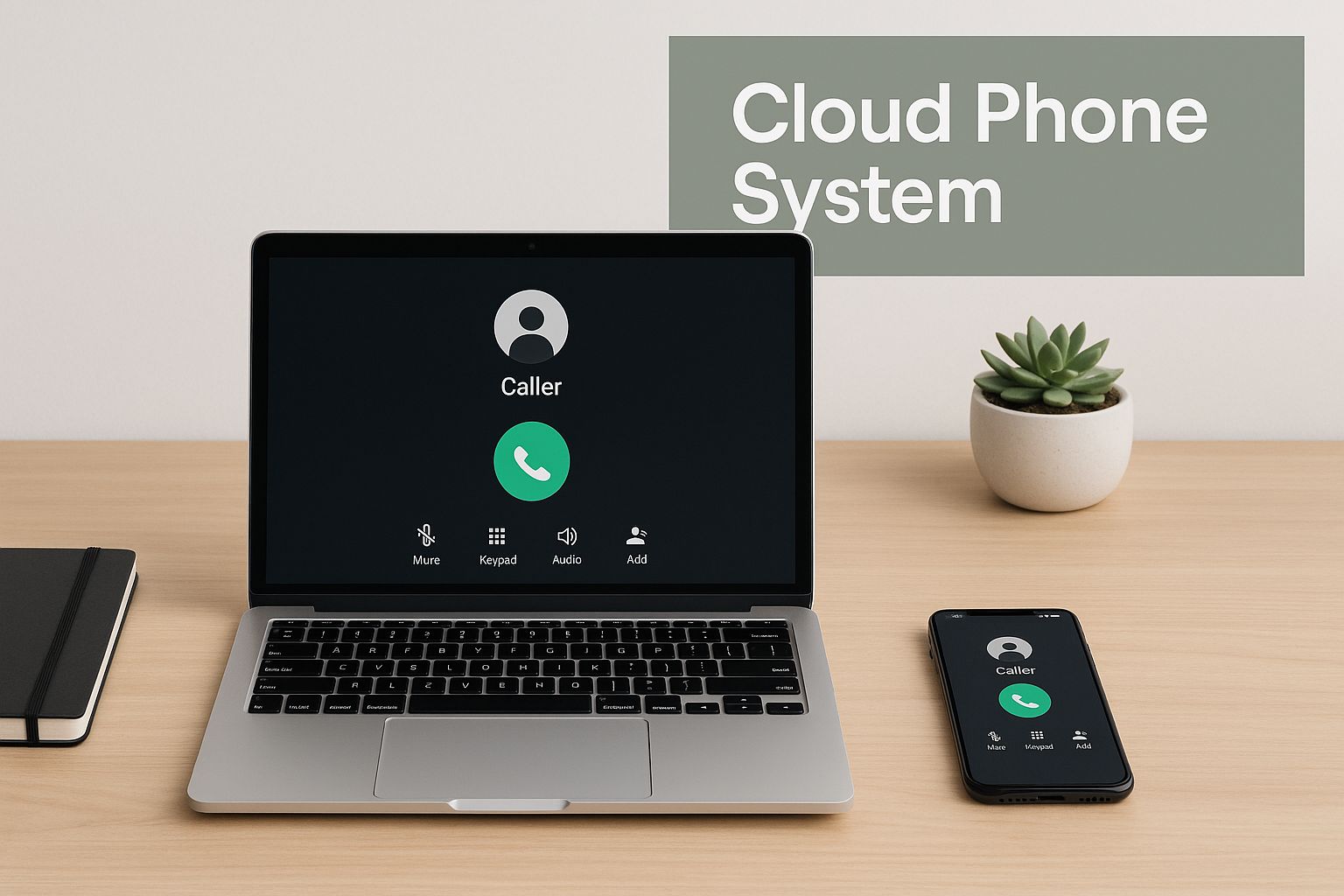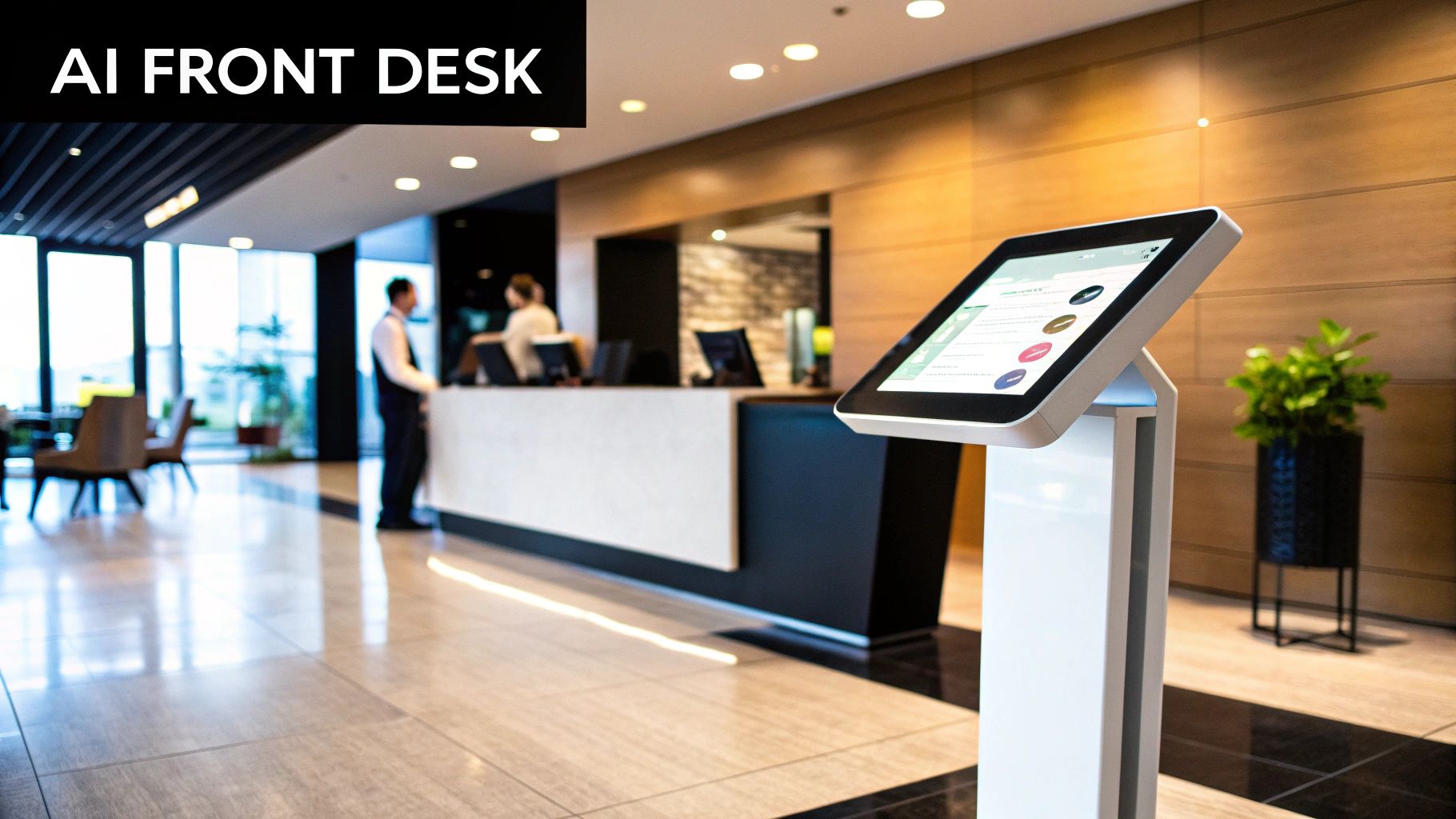Let's be honest, the term "cloud based phone system" gets thrown around a lot, but what does it actually mean for your business?
Forget about the dusty server closet stuffed with tangled wires. A cloud based phone system is simply a modern phone service that runs over your internet connection instead of old-school copper phone lines.
Think of it this way: it’s like the difference between streaming a movie on Netflix versus popping in a DVD. With Netflix, all the technology lives online, and you can watch from your TV, laptop, or phone. A cloud phone system does the same thing for your business communications—all the heavy lifting is handled by a provider online, giving you access from anywhere, on any device.
At its core, a cloud based phone system moves your entire phone network online. Every extension, every voicemail, and every feature is securely hosted "in the cloud." This is usually powered by something called Voice over Internet Protocol (VoIP), which is just a fancy way of saying it turns your internet connection into a high-powered phone line.
This simple shift changes everything. Suddenly, your desk phone, your laptop, and your smartphone can all act as your official business line. An employee can be at their desk, working from home, or even at a conference across the country, and they'll have the exact same communication tools. It feels just like a regular phone, but the technology powering it is infinitely more flexible.
This image really drives home how a cloud phone system fits into a modern business, connecting all the devices you already use.

As you can see, your business number is no longer chained to one location. It follows you wherever you need to be.
To truly grasp the difference, let's break down how these new systems stack up against the old way of doing things.
The takeaway is clear: cloud systems offer a level of agility and cost-efficiency that traditional phone lines simply can't match.
The move to cloud communications isn't just a fleeting trend—it's a fundamental shift in how modern businesses get work done. The numbers don't lie. Today, about 31% of all businesses have made the switch to VoIP.
But that adoption rate tells an even more interesting story when you look at company size.
A massive 78% of large enterprises have embraced VoIP, and a solid 61% of small businesses are now relying on it for its cost savings and simplicity. You can dig deeper into these VoIP adoption statistics to see just how widespread this technology has become.
This tells us that a cloud based phone system for business is no longer just an alternative. It's quickly becoming the standard for any company that wants to stay agile and competitive. The core benefits—flexibility, scalability, and access to powerful features—are just too good to pass up, no matter what industry you're in.
 It's one thing to understand the tech, but the real question is what a cloud phone system can actually do for your business. The benefits go way beyond just making calls over the internet—they can fundamentally change how you operate, save money, and connect with customers. This isn't just theory; it’s about solving real problems businesses face every single day.
It's one thing to understand the tech, but the real question is what a cloud phone system can actually do for your business. The benefits go way beyond just making calls over the internet—they can fundamentally change how you operate, save money, and connect with customers. This isn't just theory; it’s about solving real problems businesses face every single day.
One of the first things you'll notice is the cost savings. Traditional phone systems mean a hefty upfront investment in hardware—that clunky old PBX box in the server closet—not to mention ongoing maintenance fees and technician visits. A cloud based phone system for business gets rid of all that.
You’re no longer buying and maintaining equipment that loses value over time. Instead, you pay a simple, predictable monthly fee, which turns a huge capital expense into a manageable operating cost. The numbers back this up, with about 82% of businesses reporting they saved money after making the switch.
Modern work isn’t chained to a desk, and your phone system shouldn't be, either. Cloud systems give your team the freedom to stay connected from literally anywhere. An employee can take a call on their office line from a laptop at home, a mobile app while traveling, or even a desk phone if they're in the office.
This kind of location independence is a total game-changer for remote and hybrid teams. It guarantees that communication flows smoothly, no matter where work is happening.
Beyond flexibility, you get effortless scalability. Let's say your business is booming and you need to bring on three new team members. With an old-school system, you’d be scheduling a technician and waiting days—or even weeks. With a cloud solution, you can add new lines yourself in just a few minutes through a simple online dashboard.
This agility means your communication system grows with you, not against you. Whether you're adding one new hire or opening an entire new office, your phone system scales on demand without disruption.
A cloud based phone system isn't just a replacement for your landline; it’s a massive upgrade. It acts as a central hub for all your communications, giving you access to powerful tools that were once only available to huge enterprises. These features are built to make your team more productive and your customer interactions more effective.
You suddenly have a whole suite of professional features at your fingertips, including:
These analytics provide incredible insights, helping your business move toward data-driven decision making to improve service and streamline operations. At the end of the day, these tools turn your phone from a simple utility into a strategic business asset.
A great cloud-based phone system is so much more than just a dial tone. Think of it as a powerful toolkit, one designed to make your entire operation run smoother and look more professional. When you're weighing your options, you have to look past the basic ability to make and receive calls. The right features can completely change how you connect with customers and even how your team gets things done.
One of the absolute game-changers is the Auto-Attendant. This is your 24/7 virtual receptionist. It automatically greets every single caller with a polished, custom message and then guides them to the right person or department (“Press 1 for Sales, Press 2 for Support”). This simple tool ensures no call ever goes unanswered, even after hours, and immediately gives the impression of a larger, more organized company.
You can see how a modern dashboard, like this one from My AI Front Desk, pulls all these advanced communication features together in one place.
Everything from call routing and scheduling to analytics is laid out clearly, making it surprisingly simple to manage your entire communications hub.
Beyond just routing calls, the best systems offer features that actively give you back your most valuable resource: time. A perfect example is voicemail-to-email transcription. Instead of stopping what you're doing to dial in and check messages, the system automatically turns the audio into text and zips it straight to your inbox. You can scan a message in the middle of a meeting or while you're on the go, making you far more responsive.
Of course, a few other essentials work together to keep your workflow humming:
How do you really know when your business is busiest? Or how well your team is actually handling the call volume? That’s where call analytics comes in. A robust cloud phone system gives you a detailed dashboard packed with crucial data.
You can track metrics like call volume, peak call times, average call duration, and missed call rates. This information is gold for making smarter staffing decisions and identifying opportunities to improve customer service.
For instance, if your analytics dashboard shows a huge spike in missed calls every day between 12 PM and 1 PM, you can adjust your team's lunch schedule to make sure someone is always there to pick up. It’s all about turning raw call data into actionable business intelligence that helps you run a tighter ship and serve your customers better.
Picking the right provider for your cloud-based phone system is one of the biggest calls you'll make during this whole process. The market is absolutely flooded with options, but trust me, they are not all built the same. Your mission is to find a true partner—someone who delivers more than just a dial tone, but a rock-solid, secure, and supportive backbone for your business communications.
Making the right choice really boils down to asking the right questions. Think of it less like buying software and more like hiring a key team member. You have to look past the flashy feature list and really scrutinize the core service. That means digging into their reliability, security chops, and how they show up when you actually need help.
First things first: reliability and uptime. Your phone system is a lifeline to your customers. You can't afford for it to go down, period. Look for providers that back up their claims with a Service Level Agreement (SLA) guaranteeing a specific percentage of uptime—you want to see 99.999% or higher. That's the gold standard for ensuring the service is there when you need it.
Just as critical is security and compliance. A cloud phone system handles sensitive customer info, so airtight security isn't just a nice-to-have, it's a must. The provider needs to offer end-to-end encryption for every call and message. If you're in a regulated field like healthcare, you absolutely must confirm they are HIPAA-compliant and are willing to sign a Business Associate Agreement (BAA). The good news is that moving to the cloud actually strengthens security for most businesses.
In fact, something like 94% of companies report a better security posture after migrating their communications to the cloud. This is part of a massive trend where global public cloud spending is expected to hit $723.4 billion. You can learn more about how businesses are investing in cloud technology and the security payoffs that come with it.
Finally, let's talk about the human element and the system’s real value. How good is their customer support? Look for providers that offer 24/7 help through multiple channels—phone, email, live chat. When something goes wrong, you want a team that jumps in to help you fix it fast, not one that leaves you hanging for days. And of course, check out their pricing models. Make sure they're transparent and you won't get blindsided by hidden fees.
Beyond the basics, think about what makes a provider more than just a utility. What turns them into a strategic asset? A standard system can route calls, sure. But a truly valuable one should help you grow.
This is where an integrated tool like My AI Front Desk changes the game entirely. It can transform a simple cloud phone system into a machine that generates real revenue. Instead of a missed call hitting a dead-end voicemail, our AI can jump in, engage the caller, answer their questions, and even book an appointment right into your calendar.
That's the fundamental difference: choosing a provider that not only connects your calls but helps you turn every single one of those connections into a real, tangible opportunity for your business.
Thinking about switching to a cloud-based phone system can feel like a huge undertaking, but it’s almost always less complicated than it seems. The truth is, it’s not some massive technical overhaul. It’s really just a series of straightforward, manageable steps. With a bit of smart planning, you can make the whole process completely painless for your team and, more importantly, your customers.
The first step is a simple pre-flight check of what you actually need. Before you even start window-shopping for providers, take a hard look at your current setup. How many people on your team need a phone line? Are there any absolute must-have features, like call recording or a virtual receptionist? Getting clear on this now saves you from paying for bells and whistles you'll never use or picking a plan you’ll outgrow in six months.
Next up, take a look at your internet connection. Since your calls will now be traveling over the web, a solid, speedy connection is what delivers that crystal-clear call quality. Most business-grade internet plans are more than enough, but it’s always a good idea to confirm your bandwidth can handle the call volume you’re expecting.
A lot of business owners worry about losing their established phone number—the one that's on their trucks, their website, and their business cards. Thankfully, that's not an issue because of something called number porting.
Number porting is a standard, regulated process that lets you take your existing phone number with you from your old provider to your new cloud system. Your new provider handles all the backend work, ensuring there’s no downtime. You get to keep the number your customers already know and trust. Simple as that.
Finally, think about your team. The fanciest system in the world is useless if no one knows how to drive it. Plan a quick onboarding session to walk everyone through the new desktop or mobile app. Show them the basics: making calls, transferring customers, and checking out cool new features like voicemail-to-email. A little training goes a long, long way in making sure the rollout is a success from day one, turning a potential headache into a simple, powerful upgrade for your business.

Once you've got the essentials of a cloud-based phone system for business sorted, the real fun begins. Modern systems are so much more than call connectors; they can be genuine revenue generators, catching opportunities you'd otherwise completely miss. The secret sauce? Intelligent automation.
Think about it. A potential customer calls you at 10 PM on a Tuesday. With a standard setup, they get a flat, generic voicemail and probably hang up, never to be heard from again.
But what if a smart, conversational AI receptionist answered instead? This AI could handle their basic questions, figure out they're a hot lead, and book an appointment straight into your calendar for the next morning. That's not science fiction—it's exactly what an AI front desk does today.
An AI-powered receptionist, like My AI Front Desk, takes your phone system from a passive utility to a proactive growth engine. The most obvious superpower here is 24/7 availability. It works nights, weekends, and holidays, making sure no lead ever slips away just because you were off the clock.
This also frees up your team from the grind of answering the same questions over and over. Instead of reciting business hours or service lists, they can focus on the complex, high-value conversations that actually require a human touch. And to capture even more leads beyond the phone, you can integrate a powerful AI-powered chatbot for your website to engage visitors in real-time.
Here's the fundamental shift: Your phone system stops being a simple cost center and becomes an active player in your sales and service strategy. It’s the difference between having a basic answering machine and a dedicated, always-on assistant obsessed with growing your business.
For many business owners, this is the 'aha' moment—realizing their phone can be one of their single most effective tools for converting leads into customers.
It's easy to confuse an AI front desk with the old "press 1 for sales" auto-attendants, but they are worlds apart. One is a simple call router; the other is a revenue-generating tool.
Let’s break down the key differences:
As you can see, a standard auto-attendant simply manages calls. My AI Front Desk, on the other hand, is built to understand, engage, and act—turning every single interaction into a potential win for your business.
Switching up your business's communication system is a big move, and it's totally normal to have some questions. To make things clearer, we've put together straightforward answers to the most common concerns we hear from business owners looking into a cloud based phone system for business.
Yes, absolutely. This is probably the number one question we get, and the answer is a big, confident "yes."
The process is called "number porting," and it's a standard, pain-free procedure that your new provider handles for you. They’ll manage the entire transfer of your existing number over to the new cloud system, so you won't experience any downtime. Your customers can keep calling the same number they already know.
That’s a fair question. The great thing about modern cloud systems is that they're built for exactly this scenario. They come with smart fail-safes baked right in to keep your business running.
You can easily set up call forwarding rules ahead of time. If your office internet ever drops, the system will automatically reroute all incoming calls to a designated cell phone or another landline.
This single feature is a game-changer. It means you'll never miss an important customer call just because of a temporary internet hiccup. Your business stays open, no matter what.
Top-tier providers make security their absolute priority. A quality cloud based phone system for business uses layers of robust security measures to protect your calls and data.
Here’s what that typically looks like:
Honestly, these cloud systems are often far more secure than an old-school phone closet sitting in your office. On-site hardware is vulnerable to local break-ins, water damage, or even simple theft. Moving to the cloud puts your communications in a professionally managed, highly secure environment.
Ready to turn your phone system from a necessary expense into your best lead-generation tool? See how My AI Front Desk can capture every single lead and book appointments 24/7 to help grow your business. Explore our features today.
Start your free trial for My AI Front Desk today, it takes minutes to setup!








